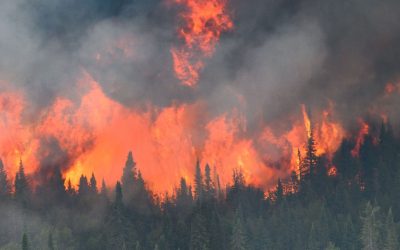On October 30, the British government released the “Stern Review on the Economics of Climate Change,” a deeply flawed attempt to justify extraordinary new taxes and regulations on carbon dumping by quantifying future economic costs should we fail to impose them. Although proponents of the theory of manmade global climate change hailed the Review and it quickly became the darling of our gullible mainstream media, skeptics and economists immediately expressed strong doubts about the validity of its approach and methods.

Sir Nicholas Stern and his colleagues say that if we don’t stop carbon dumping, and fast, the cost to the world in lost output will soon approach $10 trillion. The Review gets to that figure by overstating the cost of every possible weather disaster imaginable. It took all the worst scenarios, mixed in all the worst projections, selectively assembled data from the most pessimistic forecasts, and bundled them up in a witches’ brew of exaggeration.
Critics of the extreme environmental and economic claims of enthusiastic believers in manmade climate change can readily testify to the religious dimension this issue has assumed. Hideous distortions of minimally acceptable standards for the process of acquiring and validating information are a daily occurrence in this policy envelope, and the ensuing media hype and political demagoguery that inevitably follow a matter of some distress for the many who object.
Not only has public money flowed readily to those who conform to the Big Lie, but those who have refused to sacrifice their intellectually honesty and get on the bandwagon have been demonized and attacked. “The argument is over,” we are told, and the Stern Review is already adding to the significant momentum of those who would close the door on further discussion. Indeed, in one of the articles linked to this report, Paul Driessen mentions ominous efforts not only to shut down funding for skeptics of climate change extremism, but to subject them to other methods of thought control.
Will the Stern Review eventually be welded into the public imagination as the only valid analysis of the economics of climate change? That’s unlikely to happen, if the author of the following critique has anything to say about it:
The Stern Review of the Economics of Climate Change: A Comment, by Dr. Richard S. J. Tol
A veteran of the world’s efforts to understand mankind’s impacts on climate, Dr. Tol dismisses the Stern Review as both “alarmist and incompetent.” He chides its authors for selectivity in its materials on climate change, with a bias in the direction of the most pessimistic, and succinctly summarizes the Review’s many errors in economic analysis. Most tellingly, Dr. Tol says, “The report claims that a cost-benefit analysis was done, but none was carried out.”

Dr. Tol is upset with the Stern Review because it strengthens the risk of contempt from serious scholars towards those who grapple with problems of climate change. “This is not to say that climate change is not a problem, nor that greenhouse gas emissions should not be reduced,” he writes. “There are sound arguments for emission reduction. However, unsound analyses like the Stern Review only provide fodder for those skeptical of climate change and climate policy.”
The Stern Review in its entirety is available at the British government’s web page dedicated to it.
Dr. Richard S.J. Tol’s Internet home page lists his many credentials and publications.
He is the Michael Otto Professor of Sustainability and Global Change in the Departments of GeoSciences and Economics, and Director of the Research Unit on Sustainability and Global Change at the Centre for Marine and Climate Research, both at Hamburg University in Germany. He is also a Principal Researcher at the Institute for Environmental Studies at Vrije Universiteit in Amsterdam, the Netherlands, and an Adjunct Professor in Department of Engineering and Public Policy at Carnegie Mellon University in Pittsburgh, Pennsylvania. Dr. Tol received an M.Sc. in econometrics (1992) and a Ph.D. in economics (1997) from the Vrije Universiteit. He has held various research positions at the Institute for Environmental Studies in Amsterdam and has been a visitor to the University of Victoria, Oxford University and University College, London. He is a member of the Center for Integrated Studies of the Human Dimensions of Global Change and a board member of the Centre for Marine and Climate Research, the International Max Planck Research Schools of Earth Systems Modelling and Maritime Affairs, and the European Forum on Integrated Environmental Assessment.
Dr. Tol is interested in the application of economic, mathematical and statistical techniques, such as time series analysis, valuation, decision analysis, and game theory, to environmental problems, in particular climate change, natural disasters, and river basin management. He is known for his work on impacts of, and adaptation to climate change. He developed the Climate Framework for Uncertainty, Negotiation and Distribution, an integrated assessment model for climate change. He participates in the model comparison exercises of the Energy Modeling Forum of Stanford University. He is advisor and referee of national and international policy and research. He is an author (contributing, lead, principal and convening) of Working Groups I, II and III of the Intergovernmental Panel on Climate Change. He is an author and editor of the UNEP Handbook on Methods for Climate Change Impact Assessment and Adaptation Strategies. He is actively involved in the European Climate Forum. Dr. Tol is an editor of Energy Economics, an associate editor of Environmental and Resource Economics, and a member of the editorial board of Environmental Science and Policy and Integrated Assessment.


